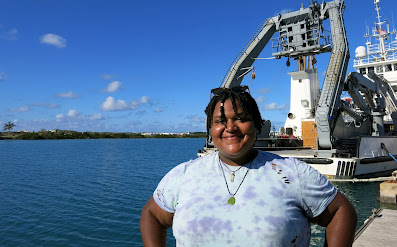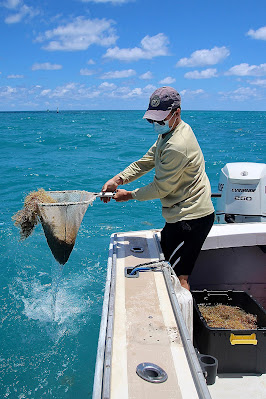Welcome back!
Here are interviews with three more of the 2020 Ocean Academy interns:
 |
Photo credit: BIOS
|
Emma O'Donnell, 21, is a rising senior in ecology and evolutionary biology at Princeton University (U.S.). She was a 2015 Marine Science Internship participant, a 2017 Bermuda Program Intern, and a 2018 Princeton-BIOS Intern. This year, she is working with Tim Noyes, a research specialist focusing on coral reef fisheries and fish populations, to collect environmental DNA (eDNA) and use it to derive data on fish biodiversity. These data will be used for her senior thesis.
What has your BIOS internship been like so far?
Productive and successful! I have learned new methods, and using these methods on real-world samples has been really interesting. I’ve also been a bit more independent this year, which I have enjoyed.
Has anything in particular impressed you while you have been at BIOS?
I’ve always been impressed by the caliber of research that takes place here, as well as the people. You also get a sense of community here which is nice.
If you could sum up your internship in five words what would they be?
Productive, supportive, enlightening, broadening, and social.
When you think about your internship here, what is a memorable experience that comes to mind?
I've worked at BIOS for a long time, starting with volunteering after school when I was quite young. I was surprised in the beginning by how much I liked being able to place the skills I'd learned in a broader context, and then using them to help with conservation in Bermuda. Realizing this fact was a memorable experience.
Has your time at BIOS changed your thoughts on what you might want to do in the future?
My experience at BIOS was my reason for choosing my major at university, and everything I do in the future will have an environmental component because of my time at BIOS. I've had great confidence-building experiences over the years.
 |
| Photo credit: BIOS |
KyAsia Scott-Fishenden, 25, is a rising third year bachelor's student in environmental geoscience at Cardiff University (U.K.). She is a first year Ocean Academy Intern working with Tarik Smith, a water engineering specialist with Koom Consulting, to perform a tank sediment study to understand how amounts of tank sediments can affect water harvesting and water catchment systems.
What has your BIOS internship been like so far?
It's been a learning experience! I've never done a virtual internship before, so that has been a learning curve. But my mentor and Kaitlin Noyes (director of education and community engagement at BIOS) have both been really helpful. I'm grateful to BIOS and I'm also enjoying myself!
If you could sum up your internship in five words what would they be?
Intriguing, educational, not very ordinary.
When you think about your internship here, what is a memorable experience that comes to mind?
The whole experience is memorable. As a child I was excited to come to BIOS. I would never have seen myself in this position. I'm also impressed by the many good people at BIOS, and I’m very grateful for their help.
Has your time at BIOS changed your thoughts on what you might want to do in the future?
Yes! It’s opened me up to a wealth of knowledge I wouldn’t have received on my own. I attended this internship to form a bridge between my university degree and post-graduate work. As I want to come back to Bermuda after I graduate, seeing that people are able to work in science and research at BIOS has been really useful.
 |
Photo credit: BIOS
|
Luke Young, 19, is a rising second year undergraduate in oceanography at the University of Southampton (England). He is a first year Ocean Academy Intern and is working with Eric Hochberg, a reef ecologist whose research centers on the interaction between light and the function of tropical and subtropical shallow water ecosystems. Luke is collecting Sargassum (a marine macro-algae) from offshore sources and using an spectrometer to determine the efficacy of spectroscopy at identifying the amounts of microplastics in Sargassum.
What has your BIOS internship been like so far?
It started off really well; it’s interesting. I'm getting field experience and learning about the practical aspects of fieldwork, such as planning a project and making a schedule to achieve a research goal.
Has anything in particular impressed you while you have been at BIOS?
My mentor, Eric Hochberg, is really good. He’s on top of what he’s doing in his field of work. It's also been great working with someone who has done a multi-year project with NASA.
When you think about your internship here, what is a memorable experience that comes to mind?
Going out and collecting
Sargassum was fun. My mentor and I went out on a boat with
Chris Flook (the small boats and docks supervisor at BIOS) and some other Ocean Academy interns. There's so much plastic in
Sargassum, it's unbelievable-- you could see it floating in the water.
Has your time at BIOS changed your thoughts on what you might want to do in the future?
Yes. It made me realize when you work in research that there’s not a lot of field work--you’re mostly inside and planning or analyzing data. So maybe research isn’t for me, but all of the work is really interesting. I’m majoring in oceanography with marine biology at university and I'd love to do something to contribute to reducing plastic pollution.
Thank you for reading about our 2020 Ocean Academy interns. We invite you to stay tuned next week as we present the final individual interviews with the interns.



No comments:
Post a Comment